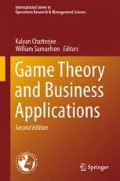Abstract
In modern economies, adjudication is the most common means of dispute resolution when voluntary alternatives such as negotiation have been exhausted. This chapter considers the incidence of out-of-court negotiated settlements versus adjudicated outcomes as predicted by the leading game-theoretic model and addresses a number of key questions. How do various offer and acceptance methods affect the terms of out-of-court settlements? Which kinds of cases settle and which go to court? How does private information about the case merits held by one or more sides affect player strategies and outcomes?
Access this chapter
Tax calculation will be finalised at checkout
Purchases are for personal use only
References
Babcock, L., et al. (1995). Biased judgments of fairness in bargaining. The American Economic Review, 85, 1337–1343.
Bebchuk, L. A. (1984). Litigation and settlement under imperfect information. The RAND Journal of Economics, 15, 404–415.
Bebchuk, L. A. (1988). Suing solely to extract a settlement offer. The Journal of Legal Studies, 17, 437–450.
Bebchuk, L. A. (1996). A new theory concerning the credibility of success of threats to sue. The Journal of Legal Studies, 25, 1–26.
Chatterjee, K., & Samuelson, W. (1983). Bargaining under incomplete information. Management Science, 31, 835–851.
Chen, K.-P., & Wang, J.-S. (2006). Fee-shifting rules in litigation with contingency fees. Journal of Law, Economics, and Organizations, 23, 519–546.
Choi, A., & Sanchirico, C. W. (2004). Should plaintiffs win what defendants lose? Litigation stakes, litigation effort, and the benefits of decoupling. The Journal of Legal Studies, 33, 323–354.
Chung, T.-Y. (1996). Settlement of litigation under rule 68: An economic analysis. The Journal of Legal Studies, 25, 261–286.
Cooter, R. D., & Rubinfeld, D. L. (1989). Economic analysis of legal disputes and their resolution. Journal of Economic Literature, 27, 1067–1097.
Daughety, A. F. (2000). Settlement. In B. Bouckaert & G. DeGeest (Eds.), Encyclopedia of law and economics (pp. 95–158). Cheltenham: Edward Elgar.
Daughety, A. F., & Reinganum, J. F. (1994). Settlement negotiations with two sided asymmetric information: Model duality, information distribution, and efficiency. International Review of Law and Economics, 14, 283–298.
Daughety, A. F., & Reinganum, J. F. (2012). Settlement. In C. W. Sanchirico (Ed.), Procedural law and economics. Cheltenham: Edward Elgar.
Farber, H. S., & White, M. J. (1991). Medical malpractice: An empirical examination of the litigation process. The RAND Journal of Economics, 22, 199–217.
Friedman, D., & Wittman, D. (2006). Litigation with symmetric bargaining and two-sided incomplete information. Journal of Law, Economics, and Organization, 23, 98–126.
Gould, J. P. (1973). The economics of legal conflicts. The Journal of Legal Studies, 2, 279–300.
Kennan, J., & Wilson, R. (1993). Bargaining with private information. Journal of Economic Literature, 31, 45–104.
Kessler, D. P., & Rubinfeld, D. L. (2008). Empirical studies of the civil justice system. In A. M. Polinsky & S. Shavell (Eds.), Handbook of law and economics (Vol. 1, pp. 343–402). Amsterdam: Elsevier B.V.
Kiser, R. L., Asher, M. A., & McShane, B. B. (2008). Let’s not make a deal: An empirical study of decision making in unsuccessful settlement negotiations. Journal of Empirical Legal Studies, 5, 551–591.
Klement, A. (2003). Threats to sue and cost divisibility under asymmetric information. International Review of Law and Economics, 23, 261–272.
Klement, A., & Neeman, Z. (2005). Against compromise: A mechanism design approach. Journal of Law, Economics, and Organizations, 21, 285–314.
Landes, W. M. (1971). An economic analysis of the courts. Journal of Law and Economics, 14, 61–107.
Lindsey, J. H., Samuelson, W., & Zeckhauser, R. (1996). Selling procedures with private information and common values. Management Science, 42(2), 220–231.
Linhart, P. B., Radner, R., & Satterthwaite, M. A. (1992). Bargaining with incomplete information. New York: Academic.
Main, B. G. M., & Park, A. (2000). The British and American rules: An experimental examination of pre-trial bargaining in the shadow of the law. Scottish Journal of Political Economy, 44, 37–60.
Milgrom, P., & Stokey, N. (1982). Information, trade and common knowledge. Journal of Economic Theory, 26(1), 17–27.
P’ng, I. P. L. (1983). Strategic behavior in suit, settlement, and trial. Bell Journal of Economics, 14, 539–550.
Reinganum, J. F., & Wilde, L. L. (1986). Settlement, litigation, and the allocation of litigation costs. The RAND Journal of Economics, 17, 557–566.
Rickman, N. (1999). Contingent fees and litigation settlement. International Review of Law and Economics, 19, 295–317.
Samuelson, W. (1998). Settlements out of court: Efficiency and equity. Group Decision and Negotiation, 7, 157–177.
Schweizer, U. (1989). Litigation and settlement under two-sided incomplete information. Review of Economic Studies, 56, 163–177.
Shavell, S. (1982). Suit, settlement and trial: A theoretical analysis under alternative methods for the allocation of legal costs. The Journal of Legal Studies, 11, 55–81.
Spier, K. E. (1992). The dynamics of pretrial negotiation. Review of Economic Studies, 59, 93–108.
Spier, K. E. (1994a). Pretrial bargaining and the design of fee-shifting rules. The RAND Journal of Economics, 25, 197–214.
Spier, K. E. (1994b). Settlement bargaining and the design of damage awards. Journal of Law, Economics and Organization, 10, 84–95.
Spier, K. E. (2007). Litigation. In A. M. Polinsky & S. Shavell (Eds.), Handbook of law and economics (Vol. 1, pp. 259–342). Amsterdam: Elsevier B.V.
Waldfogel, J. (1998). Reconciling asymmetric information and divergent expectations theories of litigation. The Journal of Legal Studies, 41, 451–476.
Author information
Authors and Affiliations
Corresponding author
Editor information
Editors and Affiliations
Rights and permissions
Copyright information
© 2014 Springer Science+Business Media New York
About this chapter
Cite this chapter
Samuelson, W. (2014). A Game-Theoretic Approach to Legal Settlements. In: Chatterjee, K., Samuelson, W. (eds) Game Theory and Business Applications. International Series in Operations Research & Management Science, vol 194. Springer, Boston, MA. https://doi.org/10.1007/978-1-4614-7095-3_8
Download citation
DOI: https://doi.org/10.1007/978-1-4614-7095-3_8
Published:
Publisher Name: Springer, Boston, MA
Print ISBN: 978-1-4614-7094-6
Online ISBN: 978-1-4614-7095-3
eBook Packages: Business and EconomicsBusiness and Management (R0)

